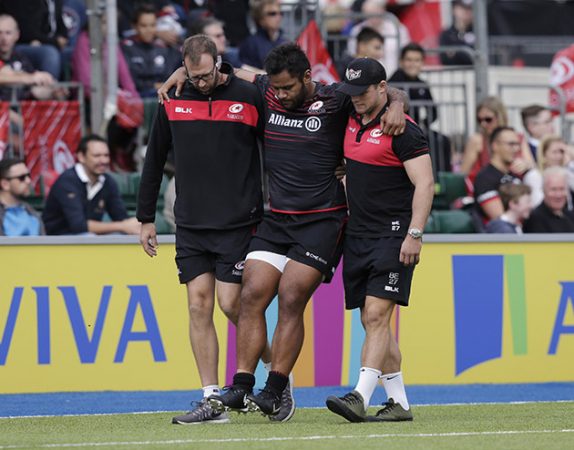Fiji’s Olympic gold medal-winning coach Ben Ryan gives his thoughts on the high number of injuries in this season’s Aviva Premiership
There has been a lot of debate about the injury crisis in the Premiership. Playing too many games, apparently. Tackling should be banned in kids’ rugby, say Newcastle University academics. Strikes from players if it’s not sorted, possibly. Come off it.
If we changed two things, injuries across all levels would reduce dramatically:
1. Improve technique.
2. Apply breakdown laws.
I watch a lot of rugby across all levels and tackle technique needs to improve. I see coaches put videos on social media showing terrible technique. If they can’t see what a correct and safe tackle looks like, how can the player?
FOR THE LATEST SUBSCRIPTION OFFERS, CLICK HERE
The majority of injuries sustained in a tackle are due to bad technique: a head down, a hit with a straight not a wrapped arm, feet too far away from the tackled player and a helicopter-type failing of legs occurring. Timing also plays a part but, again, constantly practising correct technique will reduce all this. It is a simple skill that needs replication and understanding.
Any player or coach should be able to recite the key points of good tackle technique like a favourite song. Head up, hands up, on your toes, accelerate, settle, the hit – head up, cheek to cheek, wrap your arms, chase your feet.
However, it’s the second change that will make the biggest difference. The boffins at Newcastle did say one thing that was very true: changes in sports laws can dramatically lower injury rates. In rugby we don’t even need to go that far – just apply them properly.

Sidelined: Danny Cipriani will be out for up to 12 weeks with an injury sustained in Wasps’ game with Harlequins. Photo: Getty Images
I see law after law being broken at the breakdown in games. If a law is being ‘ignored’ because it makes the game better and improves player safety, I’m all for it. But this does the opposite. Why are the following laws being ignored?
Law 16.3 (a) Players in a ruck must endeavour to stay on their feet.
Law 16.3 (b) A player must not intentionally fall or kneel in a ruck. This is dangerous play.
Law 16.3 (c) A player must not intentionally collapse a ruck. This is dangerous play.
THAT’S RIGHT – IT IS ‘DANGEROUS PLAY’ SO START APPLYING IT.
The binding law on joining a ruck is also getting abused, but these three are the ones causing injury increases. Why? Because rucks are being collapsed on a monumental level; I could show you 20-30 examples a game. Huge pressure is put on knees and ankles, all against the natural movement of joints and ligaments.
The attitude seems to be: don’t worry about binding or staying on your feet at a breakdown – just hammer into that player and then judo/saddle/crocodile roll him out of the way, using your weight and power.

Pile-up: Ben Ryan believes enforcing the laws at rucks will reduce injuries. Photo: Getty Images
It’s so much easier to retain possession in attack these days by playing direct, collision-based rugby. I like to say run into a space not a face, but that no longer seems to apply. The result? For a start, it’s mind-numbingly boring.
This lack of law application also means we’re getting more multi-phase plays as it’s harder to get the ball back. If you do go into a defensive ruck, you probably get smashed off your feet, so you stay out and throw two players into one tackle and try to get the ball back. The one defender who goes in to slow ball down or protect the back of the breakdown is a sacrificial lamb who gets smoked.
Either way, you are getting uneven, dangerous collisions – and more of them. The injury stats all back this up. The majority (75+%) of injuries in rugby are collision based. The most common are concussion and injuries to knees and ankles, with shoulders and necks next.
It’s a natural evolution. I do think the modern player spends too much time in the gym compared with skills training, but in many ways the game has driven that. It’s not about number of games or changing laws at youth level. It’s about enforcing the laws we already have.
Read Ben Ryan’s columns every month in Rugby World magazine.





